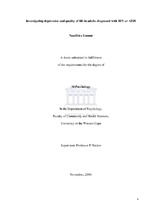| dc.description.abstract | HIV and AIDS are disease conditions that have led to high mortality rates in Southern Africa since the late 1970s. The socio-economic system has led to the unequal spread of resources’ and vulnerability and exposure to HIV is more prevalent in poorer communities. The added burden of life stresses cause for many to be isolated and stigmatised and are often not equipped with the necessary support and coping skills to deal with the magnitude of these circumstances. There is a high prevalence of mental disorders and especially depression amongst individuals infected with either HIV or AIDS. Research shows that stressful life events can impact HIV course progression and impacts the QoL of those infected with HIV or AIDS. Given the social and psychological context of HIV and AIDS, the aim of the study was to examine the relationship between depression and QoL in a sample of adults diagnosed with HIV or AIDS. This quantitative, cross-sectional study used the Becks Depression Inventory II (BDI II) and the Quality of Life Enjoyment and Satisfaction Questionnaire (Q-LES-Q), to measure the variables concerned. This battery of questionnaires was administered to a purposive sample of adult individuals diagnosed with HIV or AIDS residing in a previously disadvantaged area in the Cape Metropole region. Using SPSS, data was analysed and descriptive and inferential statistics were conducted. The study found that there were more women than men with HIV or AIDS that were found to be depressed (mild, moderate and severe depression). Furthermore, the depressive state increased when the progression of the disease increased. There were generally no significant differences in the QoL experienced within various areas of life and overall life satisfaction experienced. However, the QoL experienced in work was lower. There was a significant relationship between the depressed state and QoL and life satisfaction experienced in household duties and tasks. The contribution of this study includes informing the larger research project, with regards to future treatment regimes. It will update statistics on the prevalence of depression and QoL of adults diagnosed with HIV or AIDS in the area. This study is framed within a biopsychosocial model and is theoretically underpinned by Beck’s theory of depression. Key words: HIV, AIDS, adults, depression, quality of life (QoL), Beck Depression Inventory II (BDI II), Quality of Life Enjoyment and Satisfaction Questionnaire (Q-LES-Q), Antiretrovirals (ARV’s), prevalence data, correlations. | en_US |

